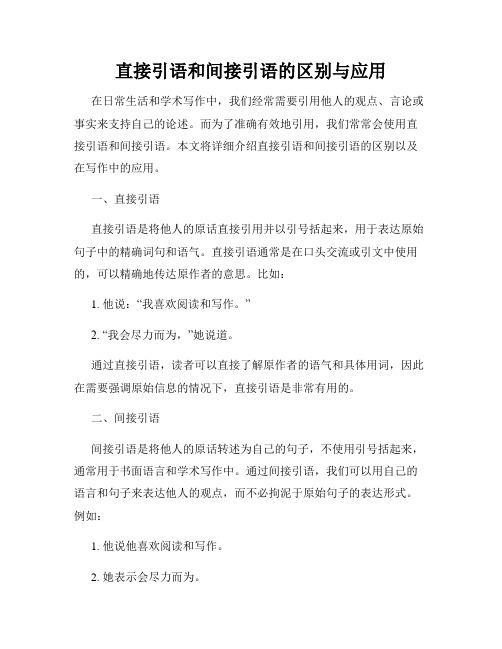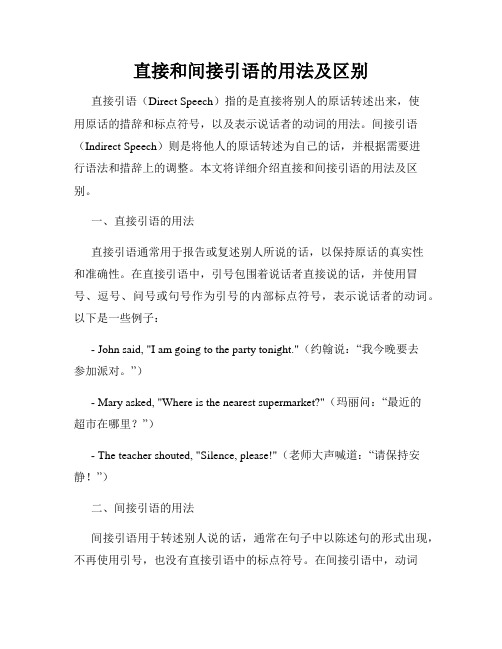直接引语和间接引语用法讲解37585
汉语直接引语和间接引语的区别和用法

汉语直接引语和间接引语的区别和用法小伙伴们!今天咱们来聊聊汉语里直接引语和间接引语这回事儿。
这可挺有用的呢,无论是写作文还是日常交流中准确传达别人的话都离不开它。
一、直接引语直接引语啊,就是直接把别人说的话原封不动地引用过来。
比如说,小明说:“我今天可高兴啦!”这里双引号里面的内容就是直接引语。
这时候要特别注意标点符号哦!直接引语中的标点符号得按照原来的样子保留着。
这看起来很简单,但建议不要忽略,要是标点符号错了,可能就改变了原句的意思啦。
那什么时候用直接引语呢?当你想强调说话者的原话,或者想生动地还原某个场景的时候就很适合用直接引语。
就像写故事的时候,“小红大喊道:‘救命啊!’”这样是不是感觉画面感一下就出来了?二、间接引语间接引语呢,就是把别人的话转述一下。
还拿小明的话举例,如果变成间接引语就是,小明说他今天可高兴啦。
发现没?这里没有双引号了,而且人称和一些词可能会有变化。
这一步有点小复杂,我通常会在这个环节花多一些时间,确保做得更仔细。
在把直接引语变成间接引语的时候,有几个地方要注意哦。
首先呢,人称要变。
比如说,“你告诉我,‘我明天来找你。
’”变成间接引语就是“你告诉我,你明天去找我。
”这里“我”变成了“你”,“你”变成了“我”。
不过,这也要根据具体的语境来变,可不能生搬硬套。
还有啊,时态可能也会有变化。
如果直接引语是过去时,在变成间接引语的时候,有时候这个时态可能要再往前推一步。
但是呢,这也不是绝对的,要根据实际情况判断。
这一点真的很重要,我通常会再检查一次,真的,确认无误是关键!三、二者的区别直接引语和间接引语的区别可真是个有趣的话题呢!最明显的区别当然就是有没有双引号啦,直接引语有双引号,间接引语没有。
然后呢,直接引语更注重原汁原味地呈现,间接引语更侧重于转述。
四、用法总结总的来说呢,直接引语适合用于需要精确引用、强调说话者原话的情况。
而间接引语在转述别人的话,尤其是不需要那么精确地引用原话的时候就派上用场啦。
语法干货直接引语和间接引语最全讲解

语法干货直接引语和间接引语最全讲解直接引语和间接引语的概述在直接引用别人的原话时,被引用的句子称为直接引语。
在用直接引语时,引语前后都要加引号。
引导引语的动词称为引用动词,如:say, ask, answer, reply等。
引用动词多数放在后面,有时放在前面,间或插在引语中间。
在把引用动词放在后面时,有时主语和动词位置可以颠倒(特别是主语较长时)。
例如:“Who is it?” Ann shouted.“I never eat meat,” she explained.“Sit up,” he commanded, “and hold out your hands.”当用自己的话转述别人的话时,被转述的部分称为间接引语。
这时被引语部分常常是引用动词的宾语。
在多数情况下,引语都由连词that引导,但在say, tell等词后可以省略。
例如:He said (that) he had lost the bag.Tell her I am out.把直接引语变成间接引语时,要改变的内容1. 要根据意思改变人称。
2. 要根据时态呼应的原则把时态加以调整。
3. 指示代词、时间状语、地点状语和动词也需要作必要的变动。
各种句式变间接引语时要发生的变化1. 陈述句直接引语如果是陈述句,变为间接引语时,用连词that引导 (that 可省略)。
例如:Tony said to me, “ I will leave this book in your desk.”→Tony told me (that) he would leave that book in my desk.如果直接引语是表示建议、要求、推测、判断的陈述句,变为间接引语时,可以变为动词不定式、V-ing形式或含虚拟语气的宾语从句。
例如:Jane said to Tony, “You’d better ask your friends for some advice.”→Jane advised Tony to ask his friends for some advice.→Jane suggested Tony asking his friends for some advic e.→Jane advised/suggested that T ony (should) ask his friends for some advice.2. 一般疑问句、选择疑问句和反意疑问句直接引语是一般疑问句,变为间接引语时,要用连词whether或if引导,同时把原来的疑问句语序变为陈述句语序。
英语中的直接引语和间接引语

英语中的直接引语和间接引语一、直接引语和间接引语的概念1. 直接引语- 直接引语就是直接引用别人的原话,被引用的部分通常放在引号内。
例如:He said, "I am going to the park." 在这个句子中,“I am going to the park.”就是直接引语,它原封不动地呈现了说话者所说的内容。
2. 间接引语- 间接引语是用自己的话转述别人的话,不用引号。
例如:He said that he was going to the park. 这里“he was going to the park”就是间接引语,它是对原句“He said, 'I am going to the park.'”的转述。
二、直接引语变间接引语的变化规则1. 人称的变化- 如果直接引语中的主语是第一人称(I或we),在变为间接引语时,要根据句子的意思相应地变为第三人称(he/she或they)。
- 例如:- 直接引语:I said, "I like this book."- 间接引语:I said that I liked this book.(这里因为主语都是I,人称不变,但如果是He said, "I like this book." 变为间接引语就是He said that he liked this book.)- 如果直接引语中的第二人称(you),在变为间接引语时,要根据转述者和听话者的关系变为第一人称(I/we)或第三人称(he/she/they)。
- 例如:- 直接引语:He said to me, "You are a good student."- 间接引语:He told me that I was a good student.- 直接引语:He said to her, "You should study hard."- 间接引语:He told her that she should study hard.2. 时态的变化- 一般现在时变为一般过去时。
直接引语和间接引语的区别与应用

直接引语和间接引语的区别与应用在日常生活和学术写作中,我们经常需要引用他人的观点、言论或事实来支持自己的论述。
而为了准确有效地引用,我们常常会使用直接引语和间接引语。
本文将详细介绍直接引语和间接引语的区别以及在写作中的应用。
一、直接引语直接引语是将他人的原话直接引用并以引号括起来,用于表达原始句子中的精确词句和语气。
直接引语通常是在口头交流或引文中使用的,可以精确地传达原作者的意思。
比如:1. 他说:“我喜欢阅读和写作。
”2. “我会尽力而为,”她说道。
通过直接引语,读者可以直接了解原作者的语气和具体用词,因此在需要强调原始信息的情况下,直接引语是非常有用的。
二、间接引语间接引语是将他人的原话转述为自己的句子,不使用引号括起来,通常用于书面语言和学术写作中。
通过间接引语,我们可以用自己的语言和句子来表达他人的观点,而不必拘泥于原始句子的表达形式。
例如:1. 他说他喜欢阅读和写作。
2. 她表示会尽力而为。
通过间接引语,我们可以更好地整合他人的观点,将其融入到我们自己的文章中,并且可以对引用内容进行适当的修改和解释,以便更好地服务于我们的写作目的。
三、区别与应用直接引语和间接引语在使用时有以下几个区别和应用场景:1. 引用方式:直接引语使用引号括起来,而间接引语不使用引号。
2. 词语转述:直接引语尽可能准确地使用原作者的词句,而对于间接引语,我们可以根据需要对他人的观点进行适当的修改和解释。
3. 语序和语气:直接引语保留了原始句子的语序和语气,而间接引语则可以根据需要进行调整。
4. 使用场景:直接引语适用于口头交流、引文和需要强调原始信息的情况,而间接引语则更适用于书面语言、学术写作和需要整合他人观点的情况。
在使用直接引语和间接引语时,我们需要注意以下几点:1. 引用准确性:无论是直接引语还是间接引语,我们都需要确保准确地引用他人的言论。
可以通过参考可靠的来源,如书籍、文章或学术论文,在引用时注明出处。
直接引语和间接引语用法讲解

直接引语和间接引语用法讲解大家好,今天我们来聊聊直接引语和间接引语的用法。
其实,这个话题还挺有意思的,因为它涉及到我们日常交流中的一些细节问题。
那么,我们就先来了解一下什么是直接引语和间接引语吧。
我们来说说直接引语。
直接引语就是别人说的话,我们直接把它抄录下来,比如:“我觉得这个问题很难。
”这句话就是直接引语。
直接引语可以用来证明别人说过的话,或者是用来描述别人的情感和态度。
比如,你的同学跟你说:“我觉得这个问题很难。
”这时候,你就可以把他的话当成直接引语,然后回答他:“是啊,我也觉得这个问题很难。
”接下来,我们来说说间接引语。
间接引语就是把别人说的话用自己的话重新表述一遍,而不是直接抄录。
比如,你的同学跟你说:“我觉得这个问题很难。
”这时候,你可以把这句话变成间接引语,比如说:“他说这个问题很难。
”或者“他觉得这个问题很难。
”这样一来,你就可以用自己的话来表达同学的观点了。
那么,直接引语和间接引语有什么区别呢?其实,它们的区别就在于是否需要加上引号。
直接引语需要加上引号,表示这是别人原话;而间接引语则不需要加引号,表示这是你自己的话。
有时候我们也会把间接引语加上引号,以示区分。
比如:“他说‘我觉得这个问题很难’”,这里的“他说”就是间接引语,“我觉得这个问题很难”则是直接引语。
那么,我们什么时候应该用直接引语呢?一般来说,当我们想强调别人说过的话时,就可以使用直接引语。
比如:“小明说他会来参加聚会。
”这时候,我们就用了直接引语来强调小明的话。
另外,当我们想让别人知道我们听到了什么时,也可以使用直接引语。
比如:“我听到小红说她喜欢吃巧克力。
”这时候,我们就用了直接引语来告诉别人我们听到了什么。
那么,我们什么时候应该用间接引语呢?一般来说,当我们想用自己的话来表达别人的观点时,就可以使用间接引语。
比如:“小红说她喜欢吃巧克力。
”这时候,我们就用了间接引语来表达小红的观点。
另外,当我们想让别人知道我们相信别人的话时,也可以使用间接引语。
直接和间接引语的用法及区别

直接和间接引语的用法及区别直接引语(Direct Speech)指的是直接将别人的原话转述出来,使用原话的措辞和标点符号,以及表示说话者的动词的用法。
间接引语(Indirect Speech)则是将他人的原话转述为自己的话,并根据需要进行语法和措辞上的调整。
本文将详细介绍直接和间接引语的用法及区别。
一、直接引语的用法直接引语通常用于报告或复述别人所说的话,以保持原话的真实性和准确性。
在直接引语中,引号包围着说话者直接说的话,并使用冒号、逗号、问号或句号作为引号的内部标点符号,表示说话者的动词。
以下是一些例子:- John said, "I am going to the party tonight."(约翰说:“我今晚要去参加派对。
”)- Mary asked, "Where is the nearest supermarket?"(玛丽问:“最近的超市在哪里?”)- The teacher shouted, "Silence, please!"(老师大声喊道:“请保持安静!”)二、间接引语的用法间接引语用于转述别人说的话,通常在句子中以陈述句的形式出现,不再使用引号,也没有直接引语中的标点符号。
在间接引语中,动词的人称和时态一般需要根据引述者的意思进行相应变化。
以下是一些例子:- John said that he was going to the party tonight.(约翰说他今晚要去参加派对。
)- Mary asked where the nearest supermarket was.(玛丽问最近的超市在哪里。
)- The teacher shouted for everyone to be silent.(老师大声喊道让大家保持安静。
)三、直接引语与间接引语的区别直接引语与间接引语之间有几个关键的区别:1. 标点符号:直接引语使用引号和说话者的标点符号,而间接引语则没有引号,并且使用导语句的标点符号。
直接引语和间接引语

直接引语和间接引语直接引语和间接引语是我们在日常交流和写作中经常使用的表达方式。
它们可以用于引用他人说过的话或表达他人的观点。
本文将从直接引语和间接引语的定义、用法、格式以及示例等方面进行探讨。
一、直接引语的定义和用法直接引语是直接将别人所说的话原封不动地引用出来。
它使用在双引号内,并保留原话的语言、说话者、时间以及语气等细节。
直接引语常用于报道、采访、对话等情境下。
直接引语的使用可以起到以下几个作用:1. 引证权威观点:通过引用权威人士的话语来支撑自己的论点,增强说服力。
2. 描绘情境:通过重述对话来展示人物性格、剧情发展或者交流背景等。
3. 引发思考:引用有趣、独特或争议性言论,引起读者的兴趣和思考。
二、直接引语的格式和示例在文章中使用直接引语需要遵守一定的格式,包括引号的使用、标点符号的位置和引用的来源注明等。
以下是直接引语的一些示例:1. 用于引证权威观点:据专家John Smith的观点,他指出:“生活中没有什么比读书更重要的了。
”2. 描绘情境:小明开心地喊道:“终于放假了,我们可以一起去海边玩了。
”3. 引发思考:一位作家曾经说过:“真正的教育是培养学生的创造力和独立思考能力。
”三、间接引语的定义和用法间接引语是将别人说过的话或表达的观点进行转述和扩展,而非原封不动地引用。
它通常用于报道、评论、总结等情境下,并不需要使用引号。
间接引语的使用可以起到以下几个作用:1. 简化表达:将原话进行概括或简化,提炼出关键信息,以便更好地传达给读者。
2. 科普知识:将专业领域的观点或研究成果以浅显易懂的方式转述,普及知识。
3. 加强解释:在引述别人观点的同时,加入自己的解释和理解,使读者更易理解。
四、间接引语的格式和示例在文章中使用间接引语同样需要遵守一定的格式,包括标点符号的位置和引用来源的注明等。
以下是间接引语的一些示例:1. 简化表达:他告诉我,他感到非常高兴因为放假了。
2. 科普知识:根据研究,多喝水对保持身体健康非常重要。
直接引语和间接引语的讲解

直接引语和间接引语的讲解直接引语(Direct Speech):当我们引用别人的话语时,若引用的是原话,被引用的部分叫直接引语。
间接引语(Indirect Speech):当我们引用别人的话语时,也可以用自己的话把意思转述出来,这种转述的别人说话的部分叫做间接引语。
例句:1. She said ,” I like English very much. “她说:“我非常喜欢英语”。
(直接引语)2. She said she liked English very much. 她说她非常喜欢英语。
(间接引语)一、直接引语与间接引语的转化A、人称人称变化可以遵循如下顺口溜“一随主,二随宾,第三人称不更新”。
“一随主”是指在直接引语变间接引语时,如果从句中的主语是第一人称或被第一人称所修饰。
从句中的人称要按照主句中主语的人称变化,如:She said. “My brother wants to go with me.”→She said her brother wanted to go with her.“二随宾”是指直接引语变间接引语时,若从句中的主语及宾语是第二人称,或被第二人“你”所修饰,从句中的人称要跟引号外的主句的宾语一致。
如果引号外的主句没有宾语,也可以用第一人称,如:He said to Kate,"How is your sister now?"→He asked Kate how her siste r was then.“第三人称不更新”是指直接引语变间接引语时,如果从句中的主语及宾语是第三人称或被第三人称所修饰从句中的人称一般不需要变化,如:Mr. Smith said,“Jack is a good wor ker.”→Mr. Smith said Jack was a good worker.B、时态直接引语在改为间接引语时,时态需要做相应的调整。
其基本法则和我们刚刚学过的宾语从句的时态变化一致,也就是说从句时态要和主句时态一致。
- 1、下载文档前请自行甄别文档内容的完整性,平台不提供额外的编辑、内容补充、找答案等附加服务。
- 2、"仅部分预览"的文档,不可在线预览部分如存在完整性等问题,可反馈申请退款(可完整预览的文档不适用该条件!)。
- 3、如文档侵犯您的权益,请联系客服反馈,我们会尽快为您处理(人工客服工作时间:9:00-18:30)。
直接引语和间接引语用法讲解一、概述引用或转述别人说的话时有两种方法:直接引述别人的原话,这叫做直接引语(direct speech)。
用自己的话转述别人的话,叫间接引语(indirect speech)。
Mr. Black said, “I'm busy.”Mr. Black said that he was busy.二、直接引语陈述句直接引语如果是陈述句,变为间接引语时,用连词that引导(that在口语中常省去),that从句之前用say、tell等动词,从句中的人称、时态、指示代词、时间状语、地点状语等要作相应的变化。
1、人称的变化He said , “I like it very much.”→He said that he liked it very much. (I改为he, it不变) He said, “You told me this story.”→He said that I had told him that story.(You改为I, me改为him, told改为had told)He said to me, “She’s left her book in your room”.→He told me that she had left her book in my room. (She’s→she had, her不变,your→my)直接引语改为间接引语人称要相应的变化,把直接引语中的第一人称(如:I,me,my,mine,we,us,our,ours)变为与主句的主语相一致的→He said that he had come to help me.He said, “I had finished my homework before supper.”→He said that he had finished his homework before supper.Zhou Lan said, “I'll do it after class.”→Zhou Lan said that she would do it after class.He said,“I shall be doing my homework then.”→He said that he should be doing his homework then.He said, “We shall have finished the work by that time.”→He said that they should have finished the work by that time.注意:直接引语如果是客观真理、名人名言、与一个具体的过去时间连用说明客观事实时,变为间接引语时,时态不变。
The teacher said, “The earth is round. ”→The teacher said that the earth is round.He said, “I was born in Shangdong in 1965.”→He said that he was born in Shangdong in 1965.(2)主句的谓语动词是现在时或将来时如果主句的谓语动词是现在时或将来时,直接引语变为间接引语时,时态一律不变He says, “I finished the work.He says that he finished the work.He will say, “I have watered the flowers.”He will say he has watered the flowers.3、指示代词、时间状语和地点状语的相应变化见下表:He said, “I met Mr. Smith this morning.”→He said that he had met Mr. Smith that morning. He said, “We went to the cinema yesterday.”→He said they had gone to the cinema the day before. Lily said, “I will come back next month.”→Lily said that she would go back the next month. He said, “It is nine o'clock now.”→He said that it was nine o'clock then.He said, “I haven't seen her today.”→He said that he hadn't seen her t hat day .She said, “I went there yesterday.”→She said that she had gone there the day before.She said, “I'll go there tomorrow.”→She said that she would go there the next day.巧记:去掉引号加that,人称变化要灵活,时态向后退一步,状语变化按规定。
三、直接引语是疑问句时直接引语如为疑问句,改为间接引语时,须将疑问句的语序改为陈述句的语序。
其人称、时态等相应的变化同上。
巧记:if(或whether)替引号,陈述语序要记牢。
时态、人称和状语要变化,千万别把它忘掉。
1、直接引语是一般问句变为间接引语时,须用连接词whether或if将其引出,使其成为间接引语的宾语从句。
如果主句中的谓语动词为said,则将其改为asked。
如果谓语动词后没有间接宾语,可以加上一个间接宾语me, him, her, them, us等。
She said, “Is your father an engineer?”→She asked me whether my father was an engineer.The teacher said to Li Ming, “Have you finished your homework?”→The teacher asked Li Ming whether he had finished his homework.2、直接引语是特殊问句如果直接引语为特殊疑问句, 改为间接引语时,仍用特殊疑问句中的疑问词what, where, when, who, how many作为连接词将其引出,构成间接引语中的宾语从句,但须将疑问式的动词改为陈述式。
如果主句中的谓语动词为said,则将其改为asked。
“What do you do every Sunday morning?”my friend said to me.→My friend asked me what I did every Sunday morning.“Where have you been, Li Ming?”the teacher asked.→The teacher asked Li Ming where he had been.I asked her, “How many English books will you read next term?”→I asked her how many English books she would read the next term.“When did you get up this morning?”asked my father.→My father asked me when I had got up that morning.注意:直接引语里是:What's wrong with……?/What's the matter? /What's the trouble?/What has happened?/等特殊疑问句时,间接引语的语序不变。
He said to her“What’s the matter with you?”他问她“你怎么了?”He asked her what was the matter with her. 他问她怎么了。
四、直接引语是祈使句巧记:去掉引号要加to;ask,order须记住,直引若是否定式,not 加在to前部。
He said,“Sit down, please.”→He asked me to sit down.The teacher said, “Don’t talk in class! ”→The teacher told us not to talk in class!The captain said to his men,“Fire! ”→The captain ordered his men to fire.五、点击考点I.改错:1.He said that he is going to London.2.Tom said they had finished the job yesterday.3.She asked me don’t smoke in the room.4.They asked that he was there.5.I asked you where was he going.6.The teacher told us not talk any more.7.The doctor said to his wife, Not wait for me.8.He asked me who I am.9.Mary said that she would see you tomorrow.10.Mother asked what the matter was.II.将下列句子改为间接引语1. “Where will you go tomorrow?”, Mother asked me.2.The old woman said to me, “Please lock the door for me.”3.The boy told his teacher, “We went to an exhibition yesterday.”4.He said, “I'll go to the station to see off a friend of mine this afternoon.”5. “Hello,how are you?”, he said to me.6.Tom said to me angrily, “Why don’t you tell me you have been here for two weeks?”7.John said to Mary,“Do you remember I borrowed a diamond necklace from you?”8.The teacher said to Li Ming,“Don’t make the same mistake again.”9. “Are you leaving today or tomorrow?”, I asked her.10.The nurse said to the children, “The sun rises in the east.”参考答案:I. 1.is→was 2.yesterday→the day before 3.don’t→notto 4.that→if5.was he→he was6.not 后面加to7.Not→Don't8.am→was9.tomorrow→the next day 10.was the matterII. 1.Mother asked me where I would go the next day.2.The old woman asked me to lock the door for her.3.The boy told his teacher that they had gone to an exhibition the day before.4.He said that he would go to the station to see off a friend of his that afternoon.5.He asked me how I was.6.Tom asked me angrily why I didn't tell him I had been there for two weeks.7.John asked Mary if she remembered he had borrowed a diamond necklace from her.8.The teacher told Li Ming not to make the same mistake again.9.I asked her whether she was leaving that day or the next day.10.The nurse told the children that the sun rises in the east.。
